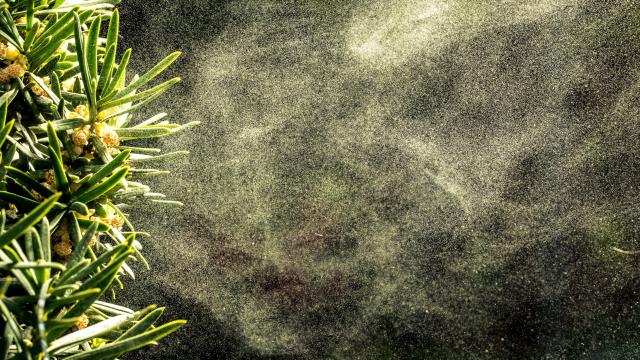If it seems like allergy season is getting worse every year, you’re probably not imagining it. Scientists who study the timing and movement of pollen have found that allergy seasons really have been getting longer, and potentially more severe.
One good read on the subject is this piece from the Conversation, which gives a readable summary of some recent research. Pollen seasons have already gotten longer in the last few decades, with spring allergy seasons starting anywhere between 3 and 22 days earlier than they used to, and fall pollen seasons starting later.
The exact length of each pollen season depends on where you are and what you’re allergic to. In the south, growing seasons are already pretty long. So the effects of climate change are more noticeable in the north, where there’s a more pronounced break between wintery weather and the warmth of spring.
If you’ve ever gotten an allergy test, you probably have a sense of what trees or plants you’re allergic to. The plants that cause most common allergies are wind-pollinated; these are the ones that blow tiny grains of pollen around. (Big, beautiful flowers tend to be pollinated by animals like bees, and they make bigger grains that don’t get into your lungs. That’s why the common allergens are plants that you wouldn’t think of as flowers; they’re all trees like birch, oak, and maple, or grasses, or inconspicuous weeds like ragweed.)
It’s not unusual to be allergic to more than one type of pollen, which is another way climate change is making things worse — pollen seasons now overlap more than they used to. For example, oak used to finish its season before birch started. Now, the two types of pollen are more likely to be in the air at the same time, making your life pretty miserable if you’re allergic to both.
What to do about it
The big problem here is climate change, which we can’t attack on an individual level. Instead, we need to get corporations and governments to wake the fuck up and start fixing things; get started by reading this from Gizmodo on the issues at stake.
As for your personal health, we have tips on living with allergies here. Keeping your house clean and changing your clothes after spending time outside can help to keep the pollen in your home to a minimum. An air purifier is also a good idea: My indoor and outdoor allergies have both gotten a lot better since I got one for my bedroom.
When you do go outside, pay attention to the pollen counts (and pollen forecasts), as well as air quality alerts. Days that are rainy, cloudy, or calm tend to have less pollen in the air. Check the National Allergy Bureau for the most accurate pollen counts near you. And if you’ve been meaning to see an allergist about your spring sneezing and haven’t made it in yet, make that appointment — next year is likely to be even worse.

Leave a Reply
You must be logged in to post a comment.